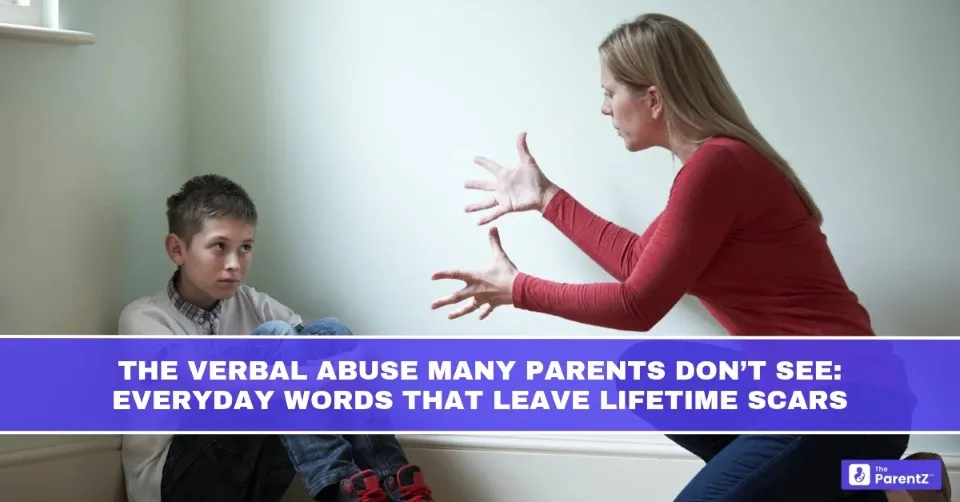Your kid just spilled juice on the carpet. Again. You've had the worst day at work, the bills are piling up, and now this. The words slip out before you can stop them: "You're so clumsy. Can't you do anything right?"
Your child's face falls. They mumble "sorry" and walk away, shoulders hunched. You think it's no big deal since, for you, it is just a moment of frustration. But inside that little head, those words are being filed away in a folder labeled "Things Mom/Dad Really Thinks About Me."
Here's the hard truth: We're hurting our kids every single day, and most of us don't even realize it.
The Words That Cut Deep
Let us tell you what your kids hear when you think you're just being a normal, stressed-out parent:
When you say: "You're being too sensitive"
They hear: "Your feelings don't matter."
When you say: "I wish you were more like your sister."
They hear: "You're not good enough as you are."
When you say: "Stop crying or I'll give you something to cry about"
They hear: "I don't care that you're in pain."
When you say: "You never listen" or "You always mess up,"
They hear: "I've already decided you're a failure."
These aren't dramatic moments of screaming abuse. These are Tuesday afternoon conversations. These are the words that slip out when we're tired, overwhelmed, or just on autopilot. And they're destroying our children's sense of self-worth one sentence at a time.
The Invisible Damage
Your kid isn't going to tell you how much it hurts. They can't. They don't have the words to explain that when you said they were "too much to handle," they started believing they needed to shrink themselves to be loved.
They won't tell you that when you called them "lazy" for struggling with homework, they stopped asking for help because they thought you'd already given up on them.
They can't express that when you said "you're just like your father" in that disgusted tone, they started hating parts of themselves they can't even change.
Instead, you'll see other signs:
- Your chatty kid suddenly goes quiet around you
- They stop sharing their problems or excitement
- They become perfectionist and anxious, terrified of making mistakes
- They start saying mean things about themselves
- They flinch when you raise your voice, even slightly
- They seem to expect the worst from every situation
Why We Do It (And Why That Doesn't Make It Okay)
Parenting is hard. You're exhausted, overwhelmed, and sometimes your kids push every single button you have. You love them more than life itself, but some days they drive you absolutely crazy.
Maybe you're repeating patterns from your own childhood. Maybe your parents talked to you this way, and you turned out "fine." Maybe you think a little tough love builds character.
But just because we survived our childhood doesn't mean it didn't leave marks. Just because we turned out okay doesn't mean we couldn't have turned out better. Just because it was normal doesn't mean it was right.
Your stress, your bad day, your own childhood trauma, none of these are your child's fault. And none of them gives you permission to use your child as an emotional punching bag.
What Kids Actually Need to Hear
Your kids need to know that they're worthy of love even when they mess up. They need to feel safe coming to you with their problems. They need to trust that you see them as a whole person, not just their worst moments.
Instead of "You never clean your room," try "I noticed your room needs attention. How can we make this easier for you?"
Instead of "You're so irresponsible," try "Everyone forgets sometimes. Let's figure out a system to help you remember."
Instead of "Stop being such a baby," try "I can see you're really upset. Tell me what happened."
It's not about being perfect. It's about catching yourself before the damage is done. It's about apologizing when you mess up. It's about remembering that the little person in front of you is learning how to value themselves based on how you treat them.
The Hard Truth About Forever
Your words don't disappear when you calm down. They live inside your child's head for years, sometimes decades. That throwaway comment you made when you were stressed? Your kid might still be hearing it at 30, wondering if they're really as worthless as you made them feel at 8.
We all know parents who wonder why their adult children don't call much, why they seem distant, and why they don't trust them with their real problems. The answer is often in the thousands of small moments when those children learned that their parent was not a safe person to be vulnerable with.
Conclusion
If you're reading this and recognizing yourself, don't spiral into guilt. Guilt helps no one. Instead, get honest with yourself and your kids.
Start paying attention to your words before they leave your mouth. When you mess up (and you will), apologize. Not a quick "sorry I yelled," but a real apology: "I was wrong to say that. You didn't deserve it. I'm working on doing better."
Your children are not mini adults. They're not equipped to handle your big emotions. They're not responsible for managing your stress or fixing your bad days. They're kids who need to feel safe, valued, and loved unconditionally.
It's never too late to start over. Your relationship with your child isn't broken beyond repair. But it does require you to take the first step, to swallow your pride, and to remember that being the adult in the relationship means taking responsibility for the emotional safety of your home.
Your words have power. Use them to build up, not tear down. Your child's future self is depending on it.





Be the first one to comment on this story.